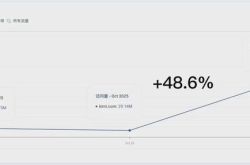["This year's Double 11 keywords: earliest ever, return to profit, and platform cooperation"
![]() 10/18 2024
10/18 2024
![]() 445
445
This year's Double 11 is destined to be different from previous years! Firstly, this year's Double 11 arrived earlier than ever before, almost seamlessly connecting with the National Day Golden Week; secondly, merchants on various platforms no longer prioritize low prices as their primary strategy; finally, large platforms have begun to cooperate with each other. So, what caused so many changes in this year's Double 11?
01. Change 1: The earlier start time reflects traffic anxiety
Let's start with the timing. Two days before the National Day holiday, Tmall and Taobao announced the Double 11 recruitment rules. Tmall's first wave of pre-sales started on October 14th this year, with deposits due at 8 pm that evening. Last year's first wave of pre-sales started on October 24th, ten days later.
But this isn't the earliest in the industry. As early as October 8th, Douyin (TikTok) kicked off its promotion, even releasing brand performance reports on the same day, with an early access period starting on October 17th. Another major live-streaming e-commerce platform, Kuaishou, also started quickly, with its Double 11 recruitment beginning on September 19th and pre-sales starting on October 10th.
Xiaohongshu, which entered the market later and holds the banner of "lifestyle e-commerce," started on October 12th, while JD.com and Pinduoduo also started at 8 pm on October 14th, but unlike Taobao, they did not have a pre-sale period and went straight into the shopping period.
Compared to last year, the platform with the most significant change in event duration is Taobao and Tmall: pre-sales began on the 14th, ten days earlier than in 2023 and 2022; JD.com was nine days earlier; Douyin was seven days earlier; and Pinduoduo was six days earlier. At present, regardless of the discounts offered by each platform, it is undoubtedly the "earliest Double 11 in history" and may also be the longest Double 11 promotion in history.
Behind this lies traffic anxiety. Currently, the consumer atmosphere is dull, and the incremental growth of mobile internet users has peaked, making retail difficult to revive. Even for online retail, the cost of acquiring traffic during promotional periods is increasingly high. In fact, last year's Double 11 already hit a low point in recent years. Last year's Double 11 Baidu search index was a "freezing point" in the past ten years, with peak search volume down 60% compared to the same period in 2022. The hottest topic on Weibo was "Is Double 11 no longer selling well?"
02. Change 2: Each platform has its own strategy, and low prices are no longer favored
Next, let's look at competitive strategies. Last year's Double 11, Taobao focused on being the lowest price on the entire network as its core goal, introducing a series of price-focused promotions such as "Low Prices Every Day" and adding labels and highlighting Tmall products with the lowest real-time prices across the network. JD.com was also competitive, shouting the slogan "Really Cheap" and declaring full price protection for over 800 million products.
Among the newcomers, Douyin and Kuaishou were the most active in Double 11, also getting involved in low-price competition. At that time, Douyin launched an official discount event, with prices for individual products starting at a 15% discount; Kuaishou not only added a mall tab on its app, but also offered discounts such as up to an 85% discount on final payments.
A year later, as Double 11 approaches again, the "gun barrels" of major platforms are no longer uniformly aimed at low prices. From the marketing strategies of platforms like Tmall, Taobao, JD.com, and Pinduoduo, words like cost-effectiveness, lowest price, and bottom price sales, which were originally used to attract traffic, have basically disappeared. Instead, a series of strategies to reduce the burden on merchants have emerged, including waiving service fees, easing restrictions on refunds only, fast cash returns, shipping subsidies, and other means.
Behind this lies the urgent need for ecological balance. Over the past few years, price wars and verbal battles in the e-commerce industry have frequently appeared in the media, becoming a killer weapon during promotional periods. Since this year, calls to prevent "internal competition"-style vicious competition have emerged across various industries. Vicious competition refers to fierce competition among peers for limited resources, which can ultimately lead to increased overall pressure and reduced efficiency.
Especially for brand merchants at the center of the ecosystem, there is a loud call for a return to "profit." Therefore, from a global internet perspective, the focus this year has clearly returned to the essence of business, namely, a win-win situation for platforms, merchants, and users, creating a balance. Price wars are not conducive to the long-term development of the industry.
03. Change 3: Breaking down barriers, platforms begin to connect
Finally, let's look at cooperation. Compared to previous years, the tense atmosphere of this year's Double 11 is not as strong, instead taking on a more cooperative tone.
One of the most notable collaborations is the early handshake between Ali Group and Tencent's camp. In September, Tmall and WeChat mutually expanded their openness, with the former integrating WeChat Pay, and the latter partially opening up its traffic pool; by the eve of Double 11, Tmall and JD.com unexpectedly moved in the same direction, interconnecting online payments, logistics fulfillment, and other aspects.
Among them, JD.com's integration of Alipay can be considered a major change that occurs once a decade. JD.com blocked Alipay in 2011, citing "high Alipay fees" and users' preference for cash on delivery. But today, these reasons have lost their footing, and as both sides need to tap into long-tail users, restoring access to Alipay has become a natural progression.
It is worth mentioning that on the eve of Double 11, platforms have also embarked on a "demolition action" to tear down walls. Since September this year, the "interconnection" action of Ali Group, Tencent, and JD.com has kicked off. Taobao has fully integrated WeChat Pay, and Meituan Food Delivery and Meituan Hotels have officially entered Alipay Mini Programs. Furthermore, JD.com has also announced that it will officially integrate Alipay, with the launch expected before Double 11.
In addition, according to The Paper, JD.com Logistics has reached a cooperation agreement with Taobao and Tmall, allowing merchants on these platforms to choose JD.com Logistics as their service provider. Currently, the systems on both sides have been largely integrated, and consumers can also track JD.com Logistics shipments within the app.
Regarding the cooperation, Wu Jia, Vice President of Ali Group, President of the Taobao and Tmall User Platform, and President of Alimama, said, "Integrating payments is the first step in our cooperation. We will continue to deepen subsequent cooperation, including in areas such as traffic. This year, a very important optimization direction for us is to return to the user and optimize the entire app experience with the user at its core. WeChat Pay is actually one of these actions, as interconnection is also a very important trend, and we are very happy to take this step with them."
04. Everything seems accidental, but it is actually inevitable
Behind these seemingly accidental changes lies a reflection of industry shifts.
The earlier start time reflects the declining popularity of Double 11 year after year. The Baidu search volume for Double 11 peaked in 2017 and has been declining year after year since then. In 2023, peak search volume decreased by 60% compared to the same period last year, a far cry from the attention received during its heyday. To attract as much traffic as possible, merchants naturally advance the timing.
The reason low prices are no longer favored is that a single low price is no longer sufficient to gain consumers' trust. Most live streams or merchants selling products will emphasize two points in their sales pitches: "I recommend products that I have personally used and found to be very good" and "Today, we offer the lowest price on the entire network." The premise for achieving this is that consumers believe the anchors can guarantee high-quality and low-priced products. In theory, this can be achieved. But in reality, it is not the case. The industry continues to expose that the low prices and better products and services promoted by anchors are not entirely true.
The cooperation between platforms is first due to changes in the market environment. Over the past few years, the internet industry has experienced unprecedented fierce competition, especially in the e-commerce sector. The rise of new platforms like Pinduoduo and Douyin has put significant pressure on Alibaba and JD.com. These newcomers have not only snatched away a considerable market share but also forced the two giants to reassess their strategic layouts. In this context, open cooperation has become an inevitable choice.
Secondly, the need for cost reduction and efficiency enhancement is also an important factor driving cooperation. Taking Taobao and JD.com as examples, for Taobao merchants, having an additional option of JD.com Logistics means more flexibility and higher efficiency. JD.com Logistics's integrated supply chain network of warehousing and distribution can provide faster delivery speeds and better service experiences, undoubtedly attracting more merchants to choose JD.com Logistics. For JD.com, integrating Alipay not only increases payment channels but also further enhances the user experience and increases user stickiness.
Finally, changes in the regulatory environment have also played a role in fueling this trend. In recent years, the state has intensified its anti-monopoly supervision of internet platforms, forcing them to open up interfaces and break down closed ecosystems.
In conclusion, Double 11 2024 is not just a shopping spree but also a reflection of the current business ecosystem. E-commerce platforms are breaking down barriers in their business models and continuously innovating in payments, logistics, and technology, striving to reach every corner of consumers' lives.
- End -







